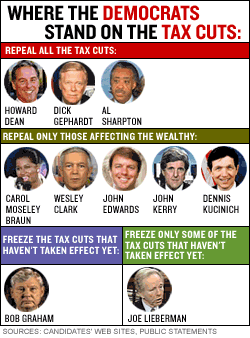NEW YORK (CNN/Money) -
The 10 Democratic candidates for President Bush's job agreed Thursday that some of the Bush tax cuts need to be repealed, but they disagreed on which cuts needed to go.
Most of the candidates in the debate at Pace University in New York City favored leaving in place tax cuts for the middle class and repealing those that favored the wealthy.
"We Democrats fought hard to put those [middle-class] tax cuts in place," said Massachusetts Sen. John Kerry. "That wasn't George W. Bush's idea -- that was our idea."

The idea of at least rolling back cuts for the wealthy seems to be gaining in political popularity. An NBC/Wall Street Journal poll released Thursday showed 56 percent of respondents suggested paying for Iraq's reconstruction by canceling tax cuts for the wealthy.
At the urging of President Bush, Congress has passed tax cuts in each of the past three years that, combined with a recession, a bear market in stocks, terrorist attacks and wars, helped to turn a $127 billion budget surplus in 2001 into a projected budget deficit of more than $400 billion in fiscal 2003, which ends Sept. 30.
Bush and his fellow Republicans say the cuts have supported consumer spending during the long jobless recovery that has followed the 2001 recession, and promise the cuts will ultimately help create jobs.
Democrats, on the other hand -- including the 10 vying to take Bush's job in 2004 -- say the tax cuts have helped few but the wealthiest Americans, while ruining the federal budget and setting the stage for a far worse fiscal crisis in the future.
In fact, Former Vermont Governor Howard Dean, Missouri Rep. Richard Gephardt and Al Sharpton favor repealing all of the tax cuts approved by Congress in the past three years.
"This plan has failed. We should not keep half of a failure or a quarter of a failure," Gephardt said. "Let's change the policy and do something else."
Dean disagreed with assertions by Kerry and Sen. John Edwards of North Carolina that taxes for the middle class would be raised by thousands of dollars if all the tax cuts were rolled back.
"Sixty percent of Americans at the bottom [of the tax scale] got $325," Dean said. "Whatever they got out there in tax cuts, the majority of Americans saw property taxes go up and tuition go up because we had enormous tax cuts and no money going to the states."
Economists are divided about the economic impact of rolling back some or all of the tax cuts.
Focusing on trade, Social Security, health
U.S. trade policy was another hot topic of the debate, which was sponsored by CNBC and the Wall Street Journal.
Some analysts believe the 2.7 million jobs lost during the Bush administration are due, in part, to companies seeking cheaper labor overseas.
Most candidates favored free-trade deals, but many called for asking trade partners to meet higher labor, environmental and human rights standards.
Few candidates seemed willing to make major changes to trade policy, unlike Ohio Rep. Dennis Kucinich, who said pulling out of NAFTA and the World Trade Organization would be his first acts as president.
Given the looming retirement of millions of baby boomers, the U.S. health-care system and the future solvency of Social Security -- threatened by massive budget deficits, according to many analysts -- were also topics of much debate.
All candidates rejected a plan, suggested by Bush, to privatize Social Security by allowing people to invest their retirement benefits in the stock market.
"I think it's great if individuals invest in the stock market, but not as a substitute for insuring the solvency of Social Security," said retired Gen. Wesley Clark.
Candidates were all over the map in terms of health-care proposals. Gephardt said he would spend hundreds of billions on a national health-care program, while Kerry dismissed his idea as impossible. Clark suggested more incremental changes, such as raising limits on Medicaid. Connecticut Sen. Joe Lieberman suggested a prescription drug plan under Medicare.
The candidates were united, however, in their criticism of Bush.
"How many jobs will we lose in this country before George Bush loses his?" Gephardt asked.
Vice President Dick Cheney was also singled out, with some candidates citing as an example of corporate corruption the $7 billion, no-bid contract given to the company he once ran, Halliburton Co. (HAL: Research, Estimates), to repair Iraq's oil infrastructure.
"I wish Halliburton built schools and streets in America -- maybe then, Bush would invest in them," Kerry said.

|

